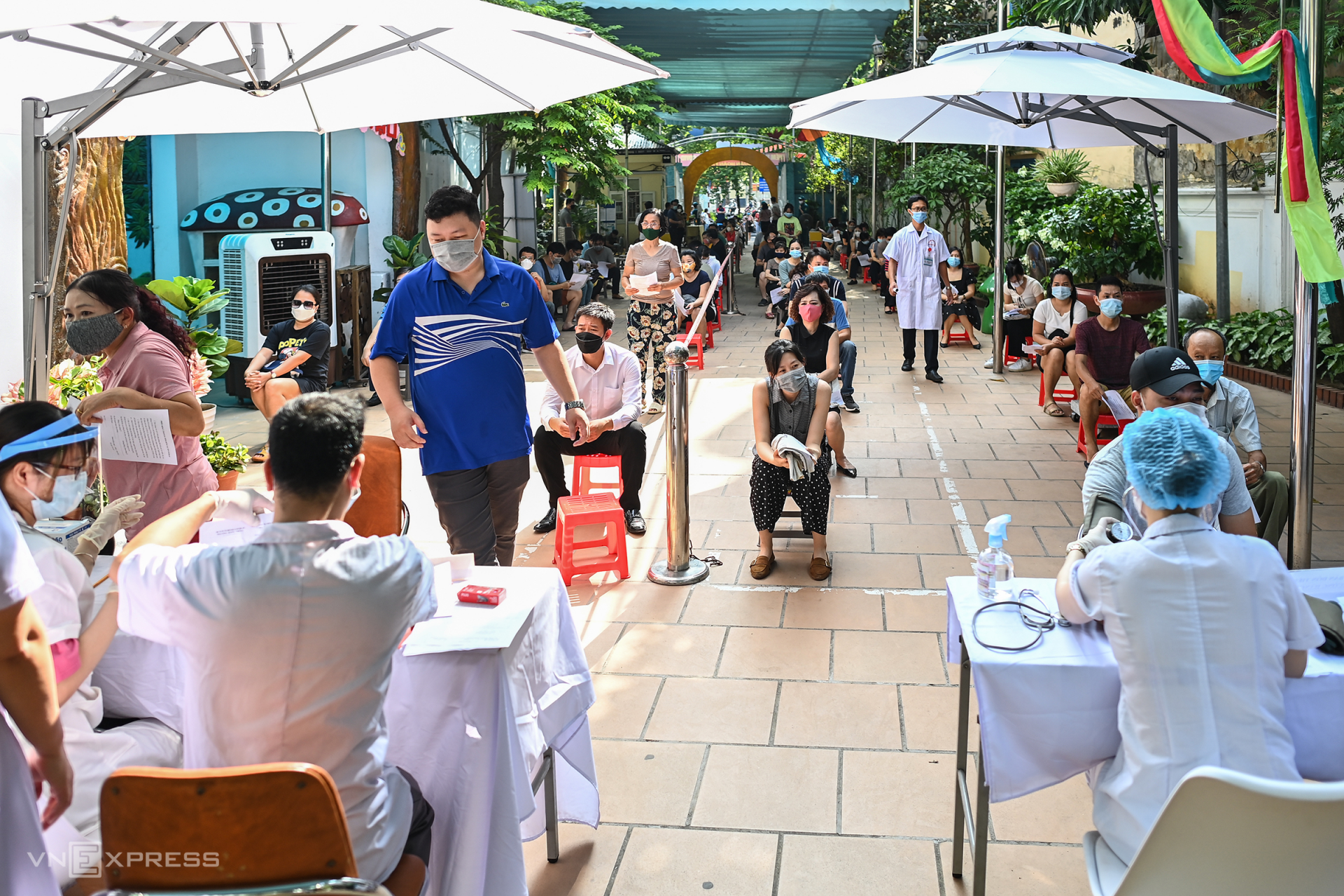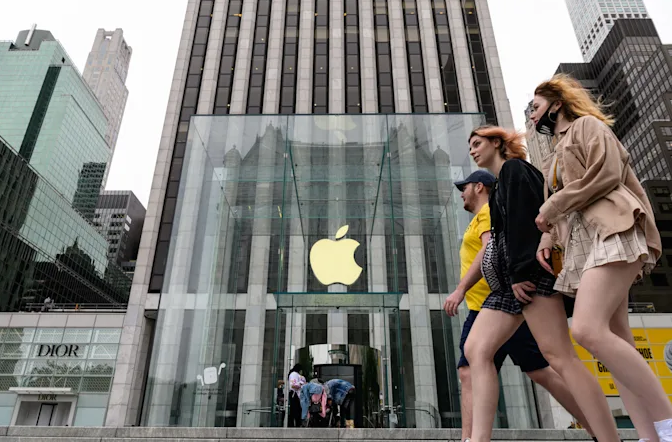Covid-19: PM Boris Johnson Warns Of Covid-19 Risks Despite "Herd Immunity"
Covid cases have fallen for seven consecutive days for the first time since last summer when mass testing was introduced across the country.
And they have dramatically halved over a 10-day period plummeting from more than 50,000 to less than 24,000 between July 17 to July 27.
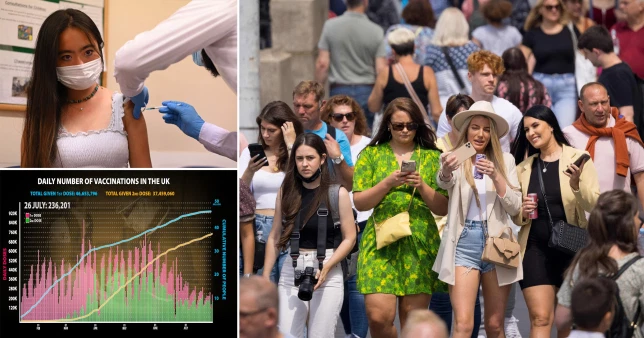 |
| One Tory minister suggested herd immunity has already been reached through the vaccine programme but the PM is not so sure (Picture: Getty) |
The prime minister insisted it was important to remember that ‘the current situation still calls for a lot of caution’, while one expert told Metro.co.uk it’s a ‘mistake’ to assume herd immunity can ever be achieved.
But Conservative MPs, who believe the worst may be over, last night reportedly called on the PM to abandon self-isolation measures that have led to widespread business chaos due to the so-called ‘pingdemic’.
According to the Daily Mail, one anonymous senior Tory minister claimed Covid ‘is all over bar the shouting’ thanks to the vaccine rollout but ‘no one has noticed’.
They told the paper: ‘Of course we have to guard against the emergence of some terrible new variant. But otherwise Covid is on the point of becoming something you live with.
‘It drops into the background, but it does not change anything terribly – maybe you have to take a test once in a while.’
When asked whether Britain had yet reached herd immunity, the minister replied: ‘Factually we are. We are there. It’s just a fact, as around 90% of adults have had a first dose of a vaccine. We are there.’
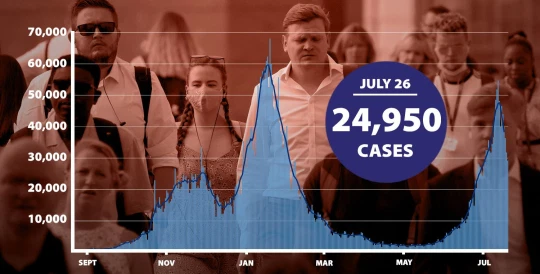 |
| Covid cases have plummeted across the UK over seven consecutive days (Picture: Metro.co.uk) |
The prime minister took a more a cautious view and insisted the virus still poses a great risk to society, as Covid-related deaths yesterday rose to more than 100 for the first time since the second wave – marking a three month-high.
Mr Johnson told LBC’s Nick Ferrari: ‘We’ve seen some encouraging recent data, there’s no question about that, but it is far, far too early to draw any general conclusions.’
‘The most important thing is to recognise that the current situation still calls for a lot of caution and for people to remember that the virus is still out there… it still presents a significant risk,’ he added.
The Sir Timothy O’Shea professor of veterinary epidemiology and data science said herd immunity in its strictest sense means that although Covid outbreaks would still happen, they would be ‘small and easily controllable’.
He said: ‘Between some people who are not going to get vaccinated and the natural loss of immunity, there will almost certainly always be a proportion of people who can get infected, and high enough to cause at least localised outbreaks.
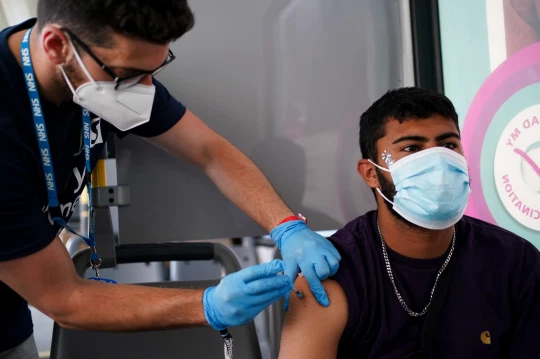 |
| Experts say the vaccine rollout has greatly helped curb the virus – but it has not yet been beaten (Picture: PA) |
‘At the moment, there is a strong chance that these outbreaks will become “generalised” across the country, to a level where some, more general restrictions will be in order.’
Dr Adam Kucharski, of the London School of Hygiene & Tropical Medicine, said the herd immunity threshold is reached when the epidemic peaks – when the R rate drops below one.
According to the most recent data, published last Friday, England’s R rate currently stands between 1.2 and 1.4.
But Dr Kucharski, an associate professor in infectious disease epidemiology, added: ‘Of course, if there’s a new variant of concern, that could change things, because current immunity might not contribute so much to reaching the required threshold for this new variant.’
Their comments come after top scientist Professor Neil Ferguson predicted the pandemic could be largely over in Britain by October.
The epidemiologist, dubbed ‘Professor Lockdown’, told BBC Radio Four’s Today programme that the public must remain cautious, particularly when the temperatures drop and children return to school.
He added: ‘We’re not completely out of the woods, but the equation has fundamentally changed. The effect of vaccines is hugely reducing the risk of hospitalisations and death.
‘And I’m positive that by late September or October time we will be looking back at most of the pandemic.
‘We will have Covid with us, we will still have people dying from Covid, but we’ll have put the bulk of the pandemic behind us.’
UK records 27,734 new coronavirus cases and 91 more deaths
The number of new COVID-19 cases recorded in the UK has risen after seven consecutive days of falls, according to government data.
The country has reported 27,734 new infections and 91 more coronavirus-related deaths in the latest 24-hour period.
The figures compare with 23,511 cases and 131 deaths announced yesterday, while 44,104 cases and 73 deaths were recorded this time last week.
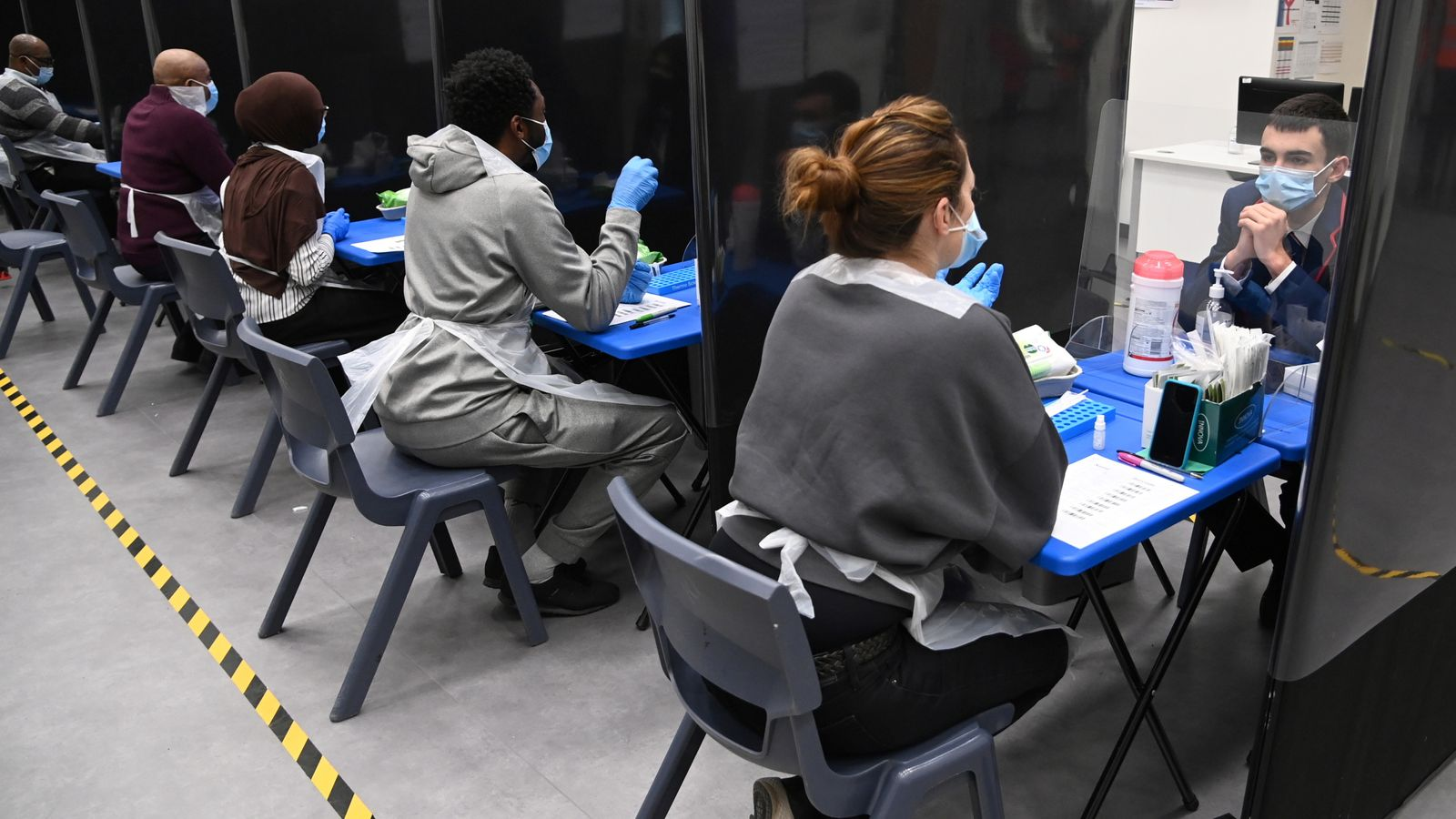 |
| Students take coronavirus tests at Harris Academy Beckenham, in London. Photo: Getty Images |
However, despite the rise in cases, the seven-day average was 36.1% down from the previous week.
Since the pandemic began, a total of 129,430 people have died in the UK within 28 days of a positive COVID test.
Separate figures published by the Office for National Statistics (ONS) show there have been 154,000 deaths registered in the UK where COVID-19 was mentioned on the death certificate.
Some 35,446 people had their first dose of a coronavirus vaccine yesterday, taking the total to 46,689,242.
And 151,851 had their second jab, meaning 37,610,911 are now fully inoculated.
It comes as Boris Johnson stressed the need for caution despite recent falls in the number of cases.
The prime minister said recent data showing a drop in cases was "encouraging" but warned the virus "still presents a significant risk".
He made the remarks after a senior minister told the Daily Mail that COVID is "all over bar the shouting".
The PM's comments were echoed by Health Secretary Sajid Javid, who said it was "encouraging" to see case numbers falling but that it was "too early to take a long-term trend from that".
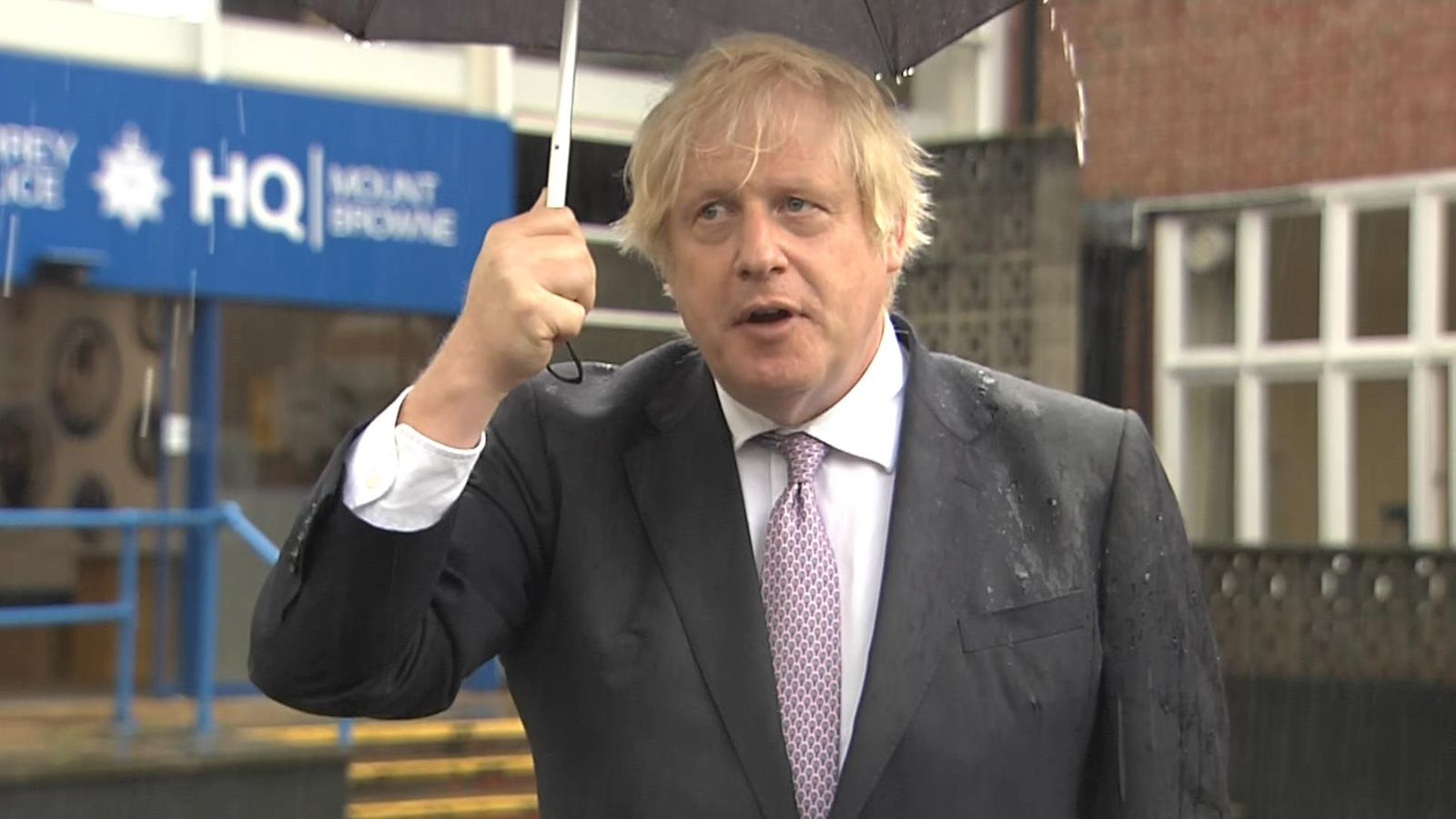 |
| Boris Johnson stressed the need for caution despite recent falls in the number of cases. Photo: SkyNews |
"There is still a lot of the virus around, unfortunately, so we have to remain cautious and vigilant," he said.
"The vaccines really are our weapon against this horrible virus - it's our wall of defence. And that wall is getting higher all the time."
And asked whether it was certain that fully vaccinated people would be able to avoid having to self-isolate from next month if they come into contact with a positive coronavirus case, Mr Johnson said: "August 16 is nailed on - there has never been any question of a review date for August 16.
"I'm very pleased that this is a country that now has the highest proportion of vaccinated adults of any country in the world - that is enabling us to make the economic progress we are."
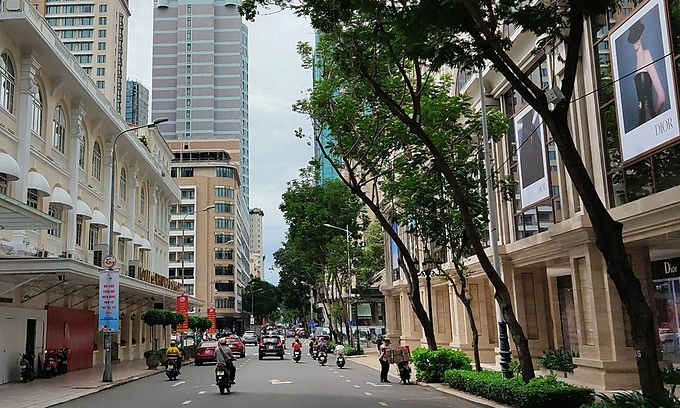 | Five-star Saigon hotels contribute to quarantine purposes Isolation zones for foreign experts entering the city to work under special permission are now provided by a number of three to five-star hotels in ... |
 | COVID 19 World Updates (July 13): Over 13 million infected, US still leads in number of cases On July 12, the World Health Organization (WHO) recorded the number of new-borne coronavirus (SARS-CoV-2) infections causing Covid-19 acute respiratory infections during the day at ... |
 | Vietnam aviation industry recovering ater COVID 19 After a long period of “hibernation” due to the Covid-19 epidemic, with great internal effort and the practical support of the Government and their partners, ... |
Recommended
 World
World
US, China Conclude Trade Talks with Positive Outcome
 World
World
Nifty, Sensex jumped more than 2% in opening as India-Pakistan tensions ease
 World
World
Easing of US-China Tariffs: Markets React Positively, Experts Remain Cautious
 World
World
India strikes back at terrorists with Operation Sindoor
Popular article
 World
World
India sending Holy Relics of Lord Buddha to Vietnam a special gesture, has generated tremendous spiritual faith: Kiren Rijiju
 World
World
Why the India-US Sonobuoy Co-Production Agreement Matters
 World
World
Vietnam’s 50-year Reunification Celebration Garners Argentine Press’s Attention
 World
World

